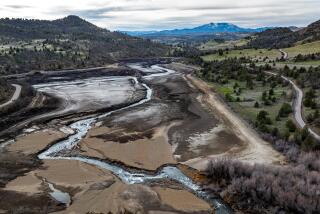After 250 years, Esselen Tribe regains a piece of its ancestral homeland

After 250 years, the Esselen Tribe of Monterey County is returning home.
A $4.5-million land deal, brokered by Portland-based environmental group Western Rivers Conservancy, will return a 1,199-acre parcel of wilderness along the Little Sur River to the tribe in the name of conservation and cultural resilience.
The transfer will mark the first land returned to the Esselen since they were displaced centuries ago.
In 1770, Spanish colonists gathered up the Esselen, whom they considered “neophytes and heathens,” said Tribal Chairman Tom Little Bear Nason, and forced them to convert to Catholicism.
“This is the center of our universe,” Nason said of the land. “We are so incredibly empowered to return to the actual birthplace of our people.”
Although the parcel represents only a small fraction of the tribe’s original ancestral territory, Nason said it will be a refuge after years of alienation.
“Elders always foretold that we would reconnect to our ancestral homeland,” he said. “So basically, a prophecy has been fulfilled.”
The property faces Pico Blanco, a stately, mossy mountain in the Santa Lucia range considered an essential part of the tribe’s origin story. But with old-growth trees, rolling hills of wildflowers and a deep river canyon, the land transfer is as much about conservation as it is about environmental justice.
“Our motivation is rivers and the critters that depend on them,” said Sue Doroff, president and co-founder of Western Rivers Conservancy. “To combine these conservation and recreation accomplishments with repatriating the land to the tribe — it’s ideal.”
The parcel was purchased with a grant provided by the California Natural Resources Agency. The previous owner was a Swedish family who initially went under contract with another buyer, Doroff said. When the Soberanes fire swept through the area in 2016, the buyer was scared off and Western Rivers Conservancy was able to move in.
“If the property was purchased by a private party, it would certainly be developed,” Doroff said, noting that would have been a “real loss” because the property links U.S. Forest Service land on the coast to the main body of Los Padres National Forest.
With one of the last viable streams for summer steelhead on the Central California coast, the land is also part of the Big Sur stronghold for the threatened fish. And since its ancient redwoods — some of the southernmost in the world — could serve as a nursery for redwood seeds, it may prove crucial for climate change adaptation.
“This property rings all the bells for fish, for wildlife,” Doroff said. “And the fact that the Esselen will be the land managers and long-term stewards of this property, and its owners, is just a bonus, and super exciting.”
When Western Rivers Conservancy first went under contract on the property in 2015, the original plan was to transfer it to the Forest Service. But locals objected, citing concerns about increased traffic, tourism and fire danger.
That’s when the group decided to partner with the Esselen, who agreed to manage the land with both the community and conservation in mind. Nason said the tribe plans to build altars, a ceremonial dance house and a bear dance lodge. They also hope to rebury ancestors whose burial sites were disturbed by development.
Because the Esselen are not a federally recognized tribe, the property will be held by the tribe’s 501(c)(3) organization, Doroff said. The tribal members will own it in fee, which means it is legally theirs, although they are obligated to follow a management plan to ensure its longevity.
That the transfer happened in the midst of a pandemic is significant, Doroff added, in that it is a reminder that these kinds of issues can’t fall by the wayside.
“We all have to pay attention to the things that we love and the places that we care about,” she said. “This work must go on, because if it doesn’t, these opportunities will be lost forever.”
More to Read
Sign up for Essential California
The most important California stories and recommendations in your inbox every morning.
You may occasionally receive promotional content from the Los Angeles Times.












